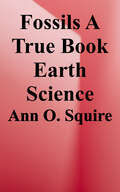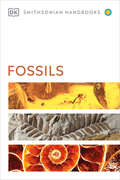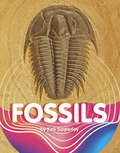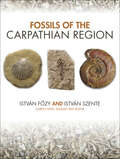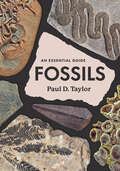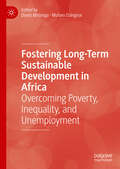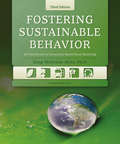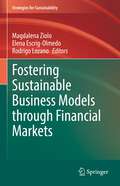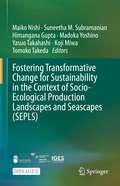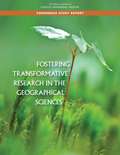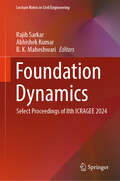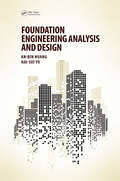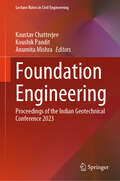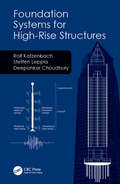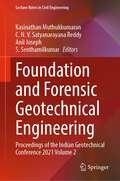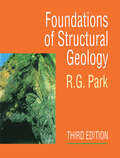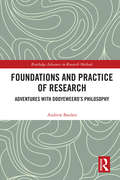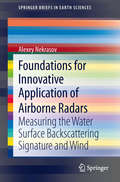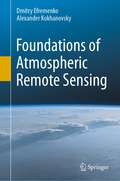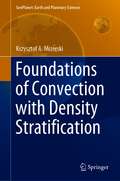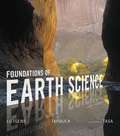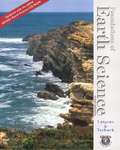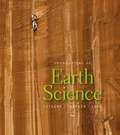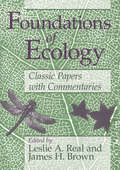- Table View
- List View
Fossils (A True Book (relaunch): Earth Science Series)
by Ann O. SquireFossils are one of the most important tools we have for learning about long-extinct wildlife. A True Book: Earth Science series presents fascinating facts and fun activities that will engage the budding earth scientist, while exploring the fields of geology, meteorology, ecology, and more. <p><p>This series includes an age appropriate (grades 3-5) introduction to curriculum-relevant subjects and a robust resource section that encourages independent study. In the 4.6 billion years since Earth was formed, many plant and animal species have come and gone. Readers will discover how fossils are formed, how paleontologists search for them, and what kinds of information they can provide.
Fossils (DK Handbooks)
by DKThe clearest and sharpest recognition guide to over 500 invertebrate, vertebrate, and plant fossils from around the world. This comprehensive pocket guide is the perfect introduction to finding, identifying, and collecting fossils. It features more than 500 species of plant and animal fossils, from trilobites and megafauna to dinosaurs and ancient trees. This handbook cuts through the complicated identification process with expertly written and thoroughly vetted text that features precise description, enabling you to recognize a species instantly. Over 1,000 photographs, with illuminating annotations, help you pick out a fossil's chief characteristics and distinguishing features, while a color illustration shows the fossil as a living plant or animal. The detailed introduction explains what a fossil is and how they are classified. Start building your own collection with advice on where to look for fossils, what tools and safety equipment are needed for collecting, and how best to organize a fossil collection. To help you in the initial stages of identification, this book provides a visual identification key that makes it easy to recognize a fossil and place it in its correct group. Finally, a concise glossary gives instant understanding of technical and scientific terms.
Fossils (Earth Materials and Systems)
by Keli SipperleyPlants and animals from millions of years ago left behind fossils. Fossils can teach people about the past. They are also used for fuel. Discover why fossils are an important part of nature!
Fossils Tell of Long Ago (Let's-Read-and-Find-Out Science 2)
by AlikiWhat is a fossil?Sometimes it's the imprint of an ancient leaf in a rock. Sometimes it's a woolly mammoth, frozen for thousands of years in the icy ground. Sometimes it's the skeleton of a stegosaurus that has turned to stone.A fossil is anything that has been preserved, one way or another, that tells about life on Earth. But you can make a fossil, too—something to be discovered a million years from now—and this book will tell you how.
Fossils of the Carpathian Region (Life of the Past)
by István Szente István FozyA comprehensive review of the fossil record of the Carpathian Basin.Fossils of the Carpathian Region describes and illustrates the region’s fossils, recounts their history, and tells the stories of key people involved in paleontological research in the area. In addition to covering all the important fossils of this region, special attention is given to rare finds and complete skeletons. The region’s fossils range from tiny foraminifera to the Transylvanian dinosaurs and mammals of the Carpathian Basin. The book also gives nonspecialists the opportunity to gain a basic understanding of paleontology. Sidebars present brief biographies of important figures and explain how to collect, prepare, and interpret fossils.“An excellently written scientific book. . . . The good illustrations are an incentive to start reading and dive into the wide area covered by two experts in their respective fields. . . . A rich source of otherwise not published background knowledge on the paleontology and geology of the region.” —Christian A. Meyer, Natural History Museum, Basel“Fossils of the Carpathian Region . . . is beautifully produced with high-quality color illustrations throughout and an exhaustive bibliography and index. . . . Highly recommended.” —Choice“This book fills a gap in the geological texts on the Carpathians, especially in Hungary, and offers a valuable wealth of geological-paleontological and scientific-historical information from the Ordovician to the Pleistocene. This extensive and relatively inexpensive work is an unrivaled recommendation for amateurs and amateur geologists / paleontologists.” —Zentralblatt für Geologie und Paläontologie [translated from German]
Fossils: An Essential Guide
by Paul D. TaylorWith stunning images and an expert guide, explore the world of fossils to uncover the story of life on Earth, from the origins of new life to mass extinctions. Ancient Earth seems like an alien world. But the fossil record can help reveal the mysteries of the organisms that have lived on our planet since its formation some 4,600 million years ago. In this engaging and beautifully illustrated book, world-renowned paleontologist Paul D. Taylor provides a comprehensive guide to all aspects of fossils to tell the story of life on Earth. Taylor begins with the basics: how fossils form, how they mark geological time, and what they tell us about the origins of life and major evolutionary events like the Cambrian Explosion. He then shows the oldest fossils—single-celled bacteria in amazing, three-billion-year-old microbial rock structures—before introducing the first animals in the fossil record. From fishes to amphibians, reptiles, and mammals, we meet these animal fossils in an appropriate evolutionary parade. Next, we imagine plants long past, charting the evolution of this kingdom and learning how ephemeral botanical remains can become permanent records. While comprehensive in his coverage of fossil groups and ages, Taylor pays particular attention to specimens fossil hunters are most likely to encounter, like crinoids and the iconic ammonites. Throughout, he introduces us to fascinating fossil folklore—like the idea that ammonites are the petrified remains of coiled snakes—and helps us distinguish true fossils from fakes. With stunning color images of many original specimens from the collections of London’s Natural History Museum, Fossils is an essential introduction, connecting life on Earth today to the ancient past.
Fostering Long-Term Sustainable Development in Africa: Overcoming Poverty, Inequality, and Unemployment
by David Mhlanga Mufaro DzingiraiThis book provides a broad and insightful guide to the economic, social, and environmental concerns seen within Africa. It highlights the central economic challenges faced by African countries and outlines ways in which long-term sustainable development in Africa can be achieved. A particular focus in given to issues of poverty, inequality, and unemployment and how poor infrastructure, limited healthcare and education, and environmental deterioration are exacerbating these issues. By looking at the limited effectiveness of traditional development initiatives, a new framework for economic development is presented that focuses on community ownership and long-term sustainability and which acknowledges the history of colonisation, economic exploitation, and political instability that has held Africa back in the past.This book takes hope from countries within the Global South that have moved towards sustainable development and sets out ways in which other countries can follow them. It will be relevant to students, researchers, and policymakers interested in development and environmental economics.
Fostering Sustainable Behavior
by Doug Mckenzie-MohrTo attain a sustainable future, we must change many of our everyday actions. This completely revised and updated edition of Fostering Sustainable Behavior shows how community-based social marketing is key to overcoming barriers and resistance, and creating new social norms.
Fostering Sustainable Business Models through Financial Markets (Strategies for Sustainability)
by Magdalena Ziolo Rodrigo Lozano Elena Escrig-OlmedoThe aim of this volume is to foster more sustainable business models through financial markets. To that end, it is necessary to know the main global challenges facing financial markets and their impact on creating sustainable value in business models of enterprises in the context of sustainable adaptation. The book focuses on assessing the decision criteria adopted by financial markets in the process of transaction risk valuation, in terms of the presence of Environmental, Social, and Governance (ESG) criteria, and by assessing the impact of including these criteria in the risk assessment process by financial markets in business decisions, leading as a consequence to building new value in the form of a sustainable business model. The book presents global ESG risks facing the financial markets, and discusses how ESG risks are managed and monitored, and how financial markets can measure and operationalize extra-financial risks in its assessment process. The book also analyses ESG risk implications and influences on company behavior, and the actions that companies should take considering the ESG assessment requirements of financial markets. Finally, it provides a comprehensive, structured, and systematic view of how financial markets and companies should adapt and improve their business models. The book provides unique challenges for investors, companies, financial markets, and for our society as a whole, advancing traditional risk management approaches to address global risks.
Fostering Transformative Change for Sustainability in the Context of Socio-Ecological Production Landscapes and Seascapes (SEPLS)
by Himangana Gupta Maiko Nishi Suneetha M. Subramanian Madoka Yoshino Yasuo Takahashi Koji Miwa Tomoko TakedaThis open access book is a compilation of case studies that provide useful knowledge and lessons that derive from on-the-ground activities and contribute to policy recommendations, focusing on the relevance of social-ecological production landscapes and seascapes (SEPLS) to “transformative change.” The concept of “transformative change” has been gaining more attention to deal with today’s environmental and development problems, whereas both policy and scientific communities have been increasingly calling for transformative change toward sustainable society. The Intergovernmental Science-Policy Platform on Biodiversity and Ecosystem Services (IPBES) has planned to start the so-called “assessment on transformative change” if approved by the IPBES plenary to be held in 2021. At present, the idea of transformative change, including its scope, methodologies, approaches and strategies, are yet to be clarified. By bringing together all of the different concerns and interests in the land/seascape, SEPLS approaches could provide practical and experience-based insights for understanding and gauging transformative change and identifying determinants of such change. This book explores how SEPLS management relates to the idea of transformative change to further the discussion of sustainable transitions in advancing sustainability science. The introductory chapter is followed by case study chapters offering real-world examples of transformative change as well as a synthesis chapter clarifying the relevance of the case study findings to policy and academic discussions. It will be of interest to scholars, policymakers and professionals in the fields related to sustainable development.
Fostering Transformative Research in the Geographical Sciences
by Engineering Medicine National Academies of SciencesThe central purpose of all research is to create new knowledge. In the geographical sciences this is driven by a desire to create new knowledge about the relations between space, place, and the anthropogenic and non-anthropogenic features and processes of the Earth. But some research goes beyond these modest aims and creates new opportunities for further research, or affects the process of knowledge acquisition more broadly, or changes the way other researchers in a domain think about the world and go about their business. Due to its positive impacts, transformative research can be regarded as inherently having greater value than more conventional research, and funding agencies clearly regard transformative research as something to be encouraged and funded through special programs. Assessments of transformative research funding initiatives are few and provide a mixed picture of their effectiveness. The challenge is whether transformative research can be identified at the time it is proposed rather than after it has been conducted, communicated, and its influence on the discipline has become clear. Fostering Transformative Research in the Geographical Sciences reviews how transformative research has emerged in the past, what its early markers were, and makes recommendations for how it can be nurtured in the future.
Foundation Dynamics: Select Proceedings of 8th ICRAGEE 2024 (Lecture Notes in Civil Engineering #572)
by Abhishek Kumar Rajib Sarkar B. K. MaheshwariThis book will present the select proceedings of the 8th International Conference on Recent Advances in Geotechnical Earthquake Engineering and Soil Dynamics (8ICRAGEE) held at the Indian Institute of Technology (IIT), Guwahati between December 11 and 14, 2024. It contains the latest research papers covering the contributions and accomplishments in geotechnical earthquake engineering and soil dynamics in the last four years. The five volumes of the book cover a wide range of topics, including but not limited to seismic hazard analysis, wave propagation and site characterization, dynamic properties and liquefaction of soils, pile foundations, offshore foundations, seismic design of retaining structures and dams, seismic slope stability and landslides, dynamic soil-structure interaction, seismic design of structures. Further, recent developments on these topics are covered in different chapters. This book will be valuable not only for researchers and professionals but also for drawing an agenda for future courses of action from the perspective of geotechnical earthquake engineering, keeping the national need at the forefront.
Foundation Engineering Analysis and Design
by Hai-Sui Yu An-Bin HuangOne of the core roles of a practising geotechnical engineer is to analyse and design foundations. This textbook for advanced undergraduates and graduate students covers the analysis, design and construction of shallow and deep foundations and retaining structures as well as the stability analysis and mitigation of slopes. It progressively introduces critical state soil mechanics and plasticity theories such as plastic limit analysis and cavity expansion theories before leading into the theories of foundation, lateral earth pressure and slope stability analysis. On the engineering side, the book introduces construction and testing methods used in current practice. Throughout it emphasizes the connection between theory and practice. It prepares readers for the more sophisticated non-linear elastic-plastic analysis in foundation engineering which is commonly used in engineering practice, and serves too as a reference book for practising engineers. A companion website provides a series of Excel spreadsheet programs to cover all examples included in the book, and PowerPoint lecture slides and a solutions manual for lecturers. Using Excel, the relationships between the input parameters and the design and analysis results can be seen. Numerical values of complex equations can be calculated quickly. non-linearity and optimization can be brought in more easily to employ functioned numerical methods. And sophisticated methods can be seen in practice, such as p-y curve for laterally loaded piles and flexible retaining structures, and methods of slices for slope stability analysis.
Foundation Engineering: Proceedings of the Indian Geotechnical Conference 2023 (Lecture Notes in Civil Engineering #686)
by Kaustav Chatterjee Koushik Pandit Anumita MishraThis book comprises select proceedings of the annual conference of the Indian Geotechnical Society 2023. The conference brings together researchers, practitioners, and academicians on various aspects of geotechnical and geoenvironmental engineering. The book presents papers on various geotechnical applications, covering topics such as (i) AI/ML applications in geotechnical engineering, ii) Analytical, physical and numerical methods, iii) Geoinformatics applications in geotechnical engineering, iv) Case studies, v) Dams/embankments, vi) Foundation Engineering, vii) Geoenvironmental Engineering, viii) Geohazards risk reduction and probabilistic analysis, ix) Characterization of geomaterials and site investigations, x) Geosynthetics engineering, xi) Geotechnical earthquake engineering, xii) Ground improvement, xiii) Landslides and slope stability, xiv) Offshore geotechnical engineering, xv) Rock mechanics and rock engineering, xvi) Sustainability in geotechnical engineering, xvii) Tunnelling and underground construction, xviii) Unsaturated soil mechanics, and other related topics. The contents of this book will be of interest to researchers and practicing engineers alike.
Foundation Systems for High-Rise Structures
by Deepankar Choudhury Rolf Katzenbach Steffen LepplaThe book deals with the geotechnical analysis and design of foundation systems for high-rise buildings and other complex structures with a distinctive soil-structure interaction. The basics of the analysis of stability and serviceability, necessary soil investigations, important technical regulations and quality and safety assurance are explained and possibilities for optimised foundation systems are given. Additionally, special aspects of foundation systems such as geothermal activated foundation systems and the reuse of existing foundations are described and illustrated by examples from engineering practice.
Foundation and Forensic Geotechnical Engineering: Proceedings of the Indian Geotechnical Conference 2021 Volume 2 (Lecture Notes in Civil Engineering #295)
by C. N. V. Satyanarayana Reddy Kasinathan Muthukkumaran Anil Joseph S. SenthamilkumarThis book comprises the select peer-reviewed proceedings of the Indian Geotechnical Conference (IGC) 2021. The contents focus on Geotechnics for Infrastructure Development and Innovative Applications. This book covers topics related to shallow foundations, pile & piled raft foundation, geotechnical design of foundation, wind turbine foundation, foundations on problematic soils, forensic geotechnical engineering, and case studies on geotechnical failures. This book is of interest to those in academia and industry.
Foundation of Structural Geology
by R G ParkSince the first edition was published in 1983, this highly-regarded introductory textbook has been used by many generations of students worldwide. It is specifically tailored to the requirements of first or second year geology undergraduates.The third edition has been extensively revised and updated to include many new sections and over 50 new or redrawn illustrations. There are now over 220 illustrations, many incorporating a second colour to highlight essential features. The format has been changed to enhance the visual attractiveness of the book.The tripartite organization of the first and second editions has been modified by combining the purely descriptive or factual aspects of fault and fold structure in the earlier chapters with a simple treatment of mechanisms, leaving the more geometrically complex treatment until after the relevant sections on stress and strain, as before. Some subjects are introduced for the first time, e.g. inversion and orogen collapse, and others have been extensively modified, e.g. the chapter on gravity controlled structures now emphasises modern work on salt tectonics. The last third of the book is devoted to the wider context of geological structures and how they relate to plate tectonics. The final two chapters have been considerably expanded and give examples of various types of geological structures in their plate tectonic settings in both modern and ancient orogenic belts.
Foundations and Practice of Research: Adventures with Dooyeweerd's Philosophy (Routledge Advances in Research Methods)
by Andrew BasdenMany of the issues on which meaningful research is founded are seldom discussed; for example, the role of everyday experience, diversity and coherence of meaning in the world, the meaningfulness and wider mandate of research, the very nature and validity of theoretical thought, and the deep presuppositions of philosophy and how they undermine the success of research. Such questions are material to the philosophies that guide research thinking in all fields, and since they cannot be satisfactorily addressed in a piecemeal fashion, this book employs the radically different philosophy of Herman Dooyeweerd to consider them together. Parts I and II discuss these issues theoretically and philosophically, while Part III discusses them practically, specifically the adventures that researchers across the world have had using Dooyeweerd's philosophy. Foundations and Practice of Research assembles a wide range of experiences of using Dooyeweerd's philosophy in research in the fields of mathematics, the natural sciences, the social sciences, design sciences and the humanities. Case studies demonstrate how Dooyeweerd's philosophy has been found fruitful in most stages of research, and the philosophical discussion backs this up. This book challenges researchers to join the adventures, including suggestions of potential research that could be carried out, as well as questions still left unanswered.
Foundations for Innovative Application of Airborne Radars
by Alexey NekrasovThe 'wind vector' - wind speed and direction - is a main meteorological quantity and relevant for air-sea exchange processes. This book explores the use of several airborne microwave instruments, some of which are part of standard aircraft equipment, in determining the local wind vector over water. This is worthwhile as local wind information is usually only available at measurements sites like weather stations and airports, and global wind information from satellites has very coarse resolution and poor temporal coverage - at most a few times daily. In his book, Nekrasov uses known results in a novel way and gives explicit and application-oriented descriptions how to additionally retrieve local wind information from standard airborne microwave instruments. The results presented here are highly valuable for flight operation above the sea (e. g. , search-and-rescue) but also for complementing other measurements of atmospheric or oceanic parameters during research flights.
Foundations of Atmospheric Remote Sensing
by Dmitry Efremenko Alexander KokhanovskyTheoretical foundations of atmospheric remote sensing are electromagnetic theory, radiative transfer and inversion theory. This book provides an overview of these topics in a common context, compile the results of recent research, as well as fill the gaps, where needed. The following aspects are covered: principles of remote sensing, the atmospheric physics, foundations of the radiative transfer theory, electromagnetic absorption, scattering and propagation, review of computational techniques in radiative transfer, retrieval techniques as well as regularization principles of inversion theory. As such, the book provides a valuable resource for those who work with remote sensing data and want to get a broad view of theoretical foundations of atmospheric remote sensing. The book will be also useful for students and researchers working in such diverse fields like inverse problems, atmospheric physics, electromagnetic theory, and radiative transfer.
Foundations of Convection with Density Stratification (GeoPlanet: Earth and Planetary Sciences)
by Krzysztof A. MizerskiThis book continues the process of systematization of knowledge about convection. It is important to put the current knowledge on weakly and strongly stratified convection in order, and provide a comprehensive description of the marginal, weakly nonlinear and fully developed stages of convective flow in both cases. The book provides a short compendium of knowledge on the linear and weakly nonlinear limits of the Boussinesq convection, and a review of the theory on fully developed Boussinesq convection. The third chapter is devoted to a detailed derivation and a study of the three aforementioned stages of stratified (anelastic) convection, with a full solution in the marginal stage provided for the first time. Detailed and systematic explanations are given. The book is intended mainly as a textbook for courses on hydrodynamics and convective flows, for the use of lecturers and students; however, it also serves for the entire scientific community as a practical reference.
Foundations of Earth Science
by Frederick K. Lutgens; Edward J. TarbuckIdeal for undergraduates with little or no science background, Foundations of Earth Science provides a student-friendly, highly visual, non-technical survey of our physical environment with balanced, up-to-date coverage of geology, oceanography, astronomy, and meteorology. Foundations of Earth Science is the brief, paperback version of the best-selling Earth Science by Lutgens and Tarbuck, and designed for introductory courses in Earth science. The new 8th Edition facilitates active learning by incorporating learning objectives throughout each chapter to provide students with a structured learning path. The learning path is tied to chapter objectives, giving students opportunities to demonstrate their understanding at the end of each section.
Foundations of Earth Science (3rd edition)
by Edward J. Tarbuck Frederick K. LutgensThis book offers a user-friendly overview of the physical environment. It retains the hallmarks expected from author's reader-friendly writing style, carefully crafted art program, and coverage of the most recent current events. It discusses key topics such as Earth materials, earth's external and internal processes, Earth's history, the global ocean, and the atmosphere.
Foundations of Earth Science 6th Edition
by Frederick K. Lutgens Edward J. Tarbuck.Earth Science by Lutgens and Tarbuck is designed for introductory courses in Earth science. It's a non-technical survey with broad, up-to-date coverage of basic topics and principles in geology, oceanography, meteorology, and astronomy. As in previous editions, the main focus is to increase your understanding of basic Earth science principles.
Foundations of Ecology: \Classic Papers with Commentaries
by Leslie A. Real and James H. BrownAssembled here for the first time in one volume are forty classic papers that have laid the foundations of modern ecology. Whether by posing new problems, demonstrating important effects, or stimulating new research, these papers have made substantial contributions to an understanding of ecological processes, and they continue to influence the field today. The papers span nearly nine decades of ecological research, from 1887 on, and are organized in six sections: foundational papers, theoretical advances, synthetic statements, methodological developments, field studies, and ecological experiments. Selections range from Connell's elegant account of experiments with barnacles to Watt's encyclopedic natural history, from a visionary exposition by Grinnell of the concept of niche to a seminal essay by Hutchinson on diversity. Six original essays by contemporary ecologists and a historian of ecology place the selections in context and discuss their continued relevance to current research. This combination of classic papers and fresh commentaries makes Foundations of Ecology both a convenient reference to papers often cited today and an essential guide to the intellectual and conceptual roots of the field. Published with the Ecological Society of America.
